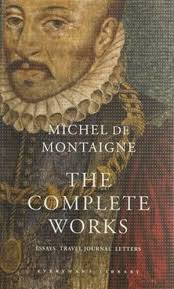Essays of Michel de Montaigne Page #2
The Essays of Michel de Montaigne are contained in three books and 107 chapters of varying length. They were originally written in Middle French and were originally published in the Kingdom of France.
II. Of Sorrow. III. That our affections carry themselves beyond us. IV. That the soul discharges her passions upon false objects, where the true are wanting. V. Whether the governor of a place besieged ought himself to go out to parley. VI. That the hour of parley is dangerous. VII. That the intention is judge of our actions VIII. Of idleness. IX. Of liars. X. Of quick or slow speech. XI. Of prognostications. XII. Of constancy. XIII. The ceremony of the interview of princes. XIV. That men are justly punished for being obstinate in the defence of a fort that is not in reason to be defended. XV. Of the punishment of cowardice. XVI. A proceeding of some ambassadors. XVII. Of fear. XVIII. That men are not to judge of our happiness till after death. XIX. That to study philosophy is to learn to die. XX. Of the force of imagination. XXI. That the profit of one man is the damage of another. XXII. Of custom, and that we should not easily change a law received. XXIII. Various events from the same counsel. XXIV. Of pedantry. XXV. Of the education of children. XXVI. That it is folly to measure truth and error by our own capacity. XXVII. Of friendship. XXVIII. Nine-and-twenty sonnets of Estienne de la Boetie. XXIX. Of moderation. XXX. Of cannibals. XXXI. That a man is soberly to judge of the divine ordinances. XXXII. That we are to avoid pleasures, even at the expense of life. XXXIII. That fortune is oftentimes observed to act by the rule of reason. XXXIV. Of one defect in our government. XXXV. Of the custom of wearing clothes. XXXVI. Of Cato the Younger. XXXVII. That we laugh and cry for the same thing. XXXVIII. Of solitude. XXXIX. A consideration upon Cicero. XL. That the relish of good and evil depends in a great measure upon the opinion we have of them. XLI. Not to communicate a man’s honour. XLII. Of the inequality amongst us. XLIII. Of sumptuary laws. XLIV. Of sleep. XLV. Of the battle of Dreux. XLVI. Of names. XLVII. Of the uncertainty of our judgment. XLVIII. Of war-horses, or destriers. XLIX. Of ancient customs. L. Of Democritus and Heraclitus. LI. Of the vanity of words. LII. Of the parsimony of the Ancients. LIII. Of a saying of Caesar. LIV. Of vain subtleties. LV. Of smells. LVI. Of prayers. LVII. Of age. THE LIFE OF MONTAIGNE [This is translated freely from that prefixed to the ‘variorum’ Paris edition, 1854, 4 vols. 8vo. This biography is the more desirable that it contains all really interesting and important matter in the journal of the Tour in Germany and Italy, which, as it was merely written under Montaigne’s dictation, is in the third person, is scarcely worth publication, as a whole, in an English dress.] The author of the Essays was born, as he informs us himself, between eleven and twelve o’clock in the day, the last of February 1533, at the chateau of St. Michel de Montaigne. His father, Pierre Eyquem, esquire, was successively first Jurat of the town of Bordeaux (1530), Under-Mayor 1536, Jurat for the second time in 1540, Procureur in 1546, and at length Mayor from 1553 to 1556. He was a man of austere probity, who had “a particular regard for honour and for propriety in his person and attire . . . a mighty good faith in his speech, and a conscience and a religious feeling inclining to superstition, rather than to the other extreme.” [Essays, ii. 2.] Pierre Eyquem bestowed great care on the education of his children, especially on the practical side of it. To associate closely his son Michel with the people, and attach him to those who stand in need of assistance, he caused him to be held at the font by persons of meanest position; subsequently he put him out to nurse with a poor villager, and then, at a later period, made him accustom himself to the most common sort of living, taking care, nevertheless, to cultivate his mind, and superintend its development without the exercise of undue rigour or constraint. Michel, who gives us the minutest account of his earliest years, charmingly narrates how they used to awake him by the sound of some agreeable music, and how he learned Latin, without suffering the rod or shedding a tear, before beginning French, thanks to the German teacher whom his father had placed near him, and who never addressed him except in the language of Virgil and Cicero. The study of Greek took precedence. At six years of age young Montaigne went to the College of Guienne at Bordeaux, where he had as preceptors the most eminent scholars of the sixteenth century, Nicolas Grouchy, Guerente, Muret, and Buchanan. At thirteen he had passed through all the classes, and as he was destined for the law he left school to study that science. He was then about fourteen, but these early years of his life are involved in obscurity. The next information that we have is that in 1554 he received the appointment of councillor in the Parliament of Bordeaux; in 1559 he was at Bar-le-Duc with the court of Francis II, and in the year following he was present at Rouen to witness the declaration of the majority of Charles IX. We do not know in what manner he was engaged on these occasions. Between 1556 and 1563 an important incident occurred in the life of Montaigne, in the commencement of his romantic friendship with Etienne de la Boetie, whom he had met, as he tells us, by pure chance at some festive celebration in the town. From their very first interview the two found themselves drawn irresistibly close to one another, and during six years this alliance was foremost in the heart of Montaigne, as it was afterwards in his memory, when death had severed it. Although he blames severely in his own book [Essays, i. 27.] those who, contrary to the opinion of Aristotle, marry before five-and-thirty, Montaigne did not wait for the period fixed by the philosopher of Stagyra, but in 1566, in his thirty-third year, he espoused Francoise de Chassaigne, daughter of a councillor in the Parliament of Bordeaux. The history of his early married life vies in obscurity with that of his youth. His biographers are not agreed among themselves; and in the same degree that he lays open to our view all that concerns his secret thoughts, the innermost mechanism of his mind, he observes too much reticence in respect to his public functions and conduct, and his social relations. The title of Gentleman in Ordinary to the King, which he assumes, in a preface, and which Henry II. gives him in a letter, which we print a little farther on; what he says as to the commotions of courts, where he passed a portion of his life; the Instructions which he wrote under the dictation of Catherine de Medici for King Charles IX., and his noble correspondence with Henry IV., leave no doubt, however, as to the part which he played in the transactions of those times, and we find an unanswerable proof of the esteem in which he was held by the most exalted personages, in a letter which was addressed to him by Charles at the time he was admitted to the Order of St. Michael, which was, as he informs us himself, the highest honour of the French noblesse.
Translation
Translate and read this book in other languages:
Select another language:
- - Select -
- 简体中文 (Chinese - Simplified)
- 繁體中文 (Chinese - Traditional)
- Español (Spanish)
- Esperanto (Esperanto)
- 日本語 (Japanese)
- Português (Portuguese)
- Deutsch (German)
- العربية (Arabic)
- Français (French)
- Русский (Russian)
- ಕನ್ನಡ (Kannada)
- 한국어 (Korean)
- עברית (Hebrew)
- Gaeilge (Irish)
- Українська (Ukrainian)
- اردو (Urdu)
- Magyar (Hungarian)
- मानक हिन्दी (Hindi)
- Indonesia (Indonesian)
- Italiano (Italian)
- தமிழ் (Tamil)
- Türkçe (Turkish)
- తెలుగు (Telugu)
- ภาษาไทย (Thai)
- Tiếng Việt (Vietnamese)
- Čeština (Czech)
- Polski (Polish)
- Bahasa Indonesia (Indonesian)
- Românește (Romanian)
- Nederlands (Dutch)
- Ελληνικά (Greek)
- Latinum (Latin)
- Svenska (Swedish)
- Dansk (Danish)
- Suomi (Finnish)
- فارسی (Persian)
- ייִדיש (Yiddish)
- հայերեն (Armenian)
- Norsk (Norwegian)
- English (English)
Citation
Use the citation below to add this book to your bibliography:
Style:MLAChicagoAPA
"Essays of Michel de Montaigne Books." Literature.com. STANDS4 LLC, 2025. Web. 9 Mar. 2025. <https://www.literature.com/book/essays_of_michel_de_montaigne_263>.








Discuss this Essays of Michel de Montaigne book with the community:
Report Comment
We're doing our best to make sure our content is useful, accurate and safe.
If by any chance you spot an inappropriate comment while navigating through our website please use this form to let us know, and we'll take care of it shortly.
Attachment
You need to be logged in to favorite.
Log In